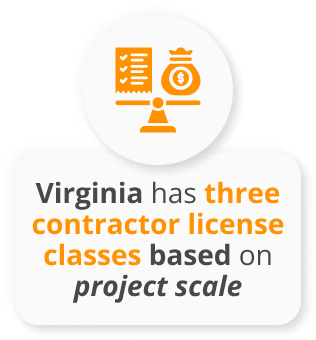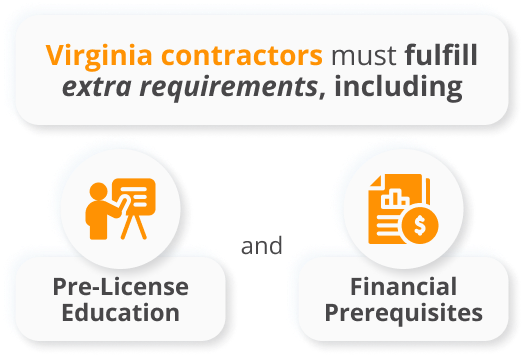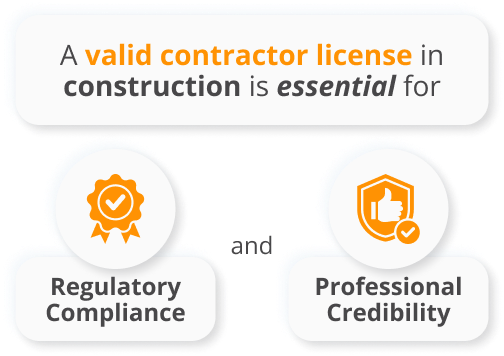Build Your Success in Virginia with the Right License: Your Blueprint to Professional Growth and Compliance! Get Your General Contractor License in Virginia.
Importance of Licensing in the Construction Industry
In the construction industry, holding a valid contractor license is not just a regulatory requirement; it is a mark of professionalism and credibility. Licensing serves several critical purposes:
- Ensures Quality and Safety: Licensed contractors are expected to adhere to industry standards and safety regulations, which guarantees quality workmanship and protects public safety.
- Legal Compliance: Operating without a license in jurisdictions where it’s required can lead to legal repercussions, including fines and penalties.
- Enhances Trust: Clients are more likely to trust and hire contractors who are licensed, as it demonstrates a commitment to professionalism and adherence to legal standards.
- Market Competitiveness: A license can give contractors a competitive edge in the market, allowing them to take on larger, more profitable projects.
Types of Contractor Licenses in Virginia
In Virginia, contractor licenses are classified into three categories based on the scale and value of the projects. Understanding the specific eligibility criteria and requirements for each class is essential for contractors to ensure they are appropriately licensed for their work. Get Your General Contractor License in Virginia.

Class A License: Eligibility and Requirements
- Eligibility Criteria:
- Project Value: Applicable for projects exceeding $2.8 million.
- Experience: Requires a minimum of five years of experience in the chosen specialty.
- Requirements:
- Experience Verification: Providing proof of the required experience in the construction field.
- Financial Documentation: Submission of a financial statement or surety bond with a minimum equity of $45,000.
- Examination: Passing the Virginia Contractor Exam for the specific specialty area.
- Insurance: Maintaining general liability and workers’ compensation insurance as per state regulations.
Ideal For: Large-scale contractors handling significant construction projects, often involving complex operations and substantial financial investments.
Class B License: Eligibility and Requirements
- Eligibility Criteria:
- Project Value: For projects between $140,000 and $2.8 million.
- Experience: Requires at least three years of experience in the construction specialty.
- Requirements:
- Experience Verification: Documentation proving the required level of experience in the relevant field.
- Financial Capability: A financial statement or bond demonstrating a minimum equity of $15,000.
- Contractor Exam: Successfully passing the Virginia Contractor Exam in the chosen specialty.
- Insurance Coverage: General liability and workers’ compensation insurance are mandatory.
Ideal For: Medium-sized construction firms and contractors who typically undertake moderately sized projects that require a significant level of expertise and financial commitment.
Class C License: Eligibility and Requirements
- Eligibility Criteria:
- Project Value: Suitable for projects valued under $140,000.
- Experience: A minimum of two years of experience in the chosen specialty is required.
- Requirements:
- Experience Proof: Providing evidence of the necessary experience in the field.
- Financial Requirement: There is no specific financial statement or surety bond requirement for this class.
- Licensing Exam: Passing the Virginia Contractor Exam for the relevant specialty.
- Insurance Necessity: As with other classes, general liability and workers’ compensation insurance are required.
Ideal For: Small-scale contractors or those new to the industry, focusing on smaller projects that are less complex but still require a professional approach and adherence to safety standards.
Additional Licensing Requirements
In addition to meeting the specific criteria for each class of license, contractors in Virginia must fulfill additional requirements to ensure they are fully prepared and qualified for the responsibilities that come with their role. These include pre-license education and financial prerequisites. Get Your General Contractor License in Virginia.

Pre-license Education: What You Need to Know
- Mandatory for All Applicants: Regardless of the license class, all contractors in Virginia are required to complete eight hours of pre-license education. This is a critical step in preparing for the licensing process.
- Content and Purpose: The pre-license education covers essential topics such as business management, state laws and regulations, and the basics of building codes. It is designed to ensure that contractors are well-versed in the legal and administrative aspects of running a construction business in Virginia.
- Approved Providers: The education must be undertaken through a provider approved by the Virginia Department of Professional and Occupational Regulation (DPOR). This ensures the quality and relevance of the education.
- Certification of Completion: Upon finishing the course, contractors receive a certificate of completion, which must be submitted with the license application.
Financial Statement and Surety Bond Requirements
- Class A License:
- Equity or Bond: Applicants must demonstrate a minimum equity of $45,000 or provide a surety bond of the same amount. This financial requirement is in place to ensure the contractor’s financial stability and ability to manage large-scale projects.
- Class B License:
- Equity or Bond: For Class B licenses, the financial requirement is a minimum equity of $15,000 or a surety bond. This lower threshold reflects the medium scale of projects under this category.
- Class C License:
- No Specific Financial Requirement: Class C licenses do not have a stipulated financial statement or surety bond requirement, making it more accessible for small-scale contractors or those new to the industry.
- Purpose of Financial Requirements: These financial prerequisites are designed to protect the public and clients by ensuring that contractors have the necessary financial backing to undertake and complete projects responsibly.
- Submission of Financial Documents: Contractors must submit their financial statement or surety bond along with their application. This documentation is reviewed as part of the licensing process to confirm the contractor’s financial credibility.
Application Process for Contractor Licensing
Navigating the application process for a contractor’s license in Virginia can be straightforward if approached methodically. This section provides a step-by-step guide to help contractors successfully submit their application, along with the necessary documentation and fees.
Step-by-Step Guide to Submitting Your Application
Before starting the application process, gather all necessary documents, including proof of experience, financial statements or surety bonds, certificates of pre-license education, and insurance documents.
The application form is available on the Virginia Department of Professional and Occupational Regulation (DPOR) Website. Ensure that all sections are filled out accurately and comprehensively.
Include all the supporting documents with your application. This typically includes:
- Proof of pre-license education.
- Documentation verifying your experience.
- Financial statements or surety bonds (for Class A and Class B licenses).
- Certificates of insurance for general liability and workers’ compensation.
Before submitting, review the application and accompanying documents to ensure everything is complete and accurate. Inaccuracies can lead to delays in the processing of your application.
Applications can usually be submitted online through the DPOR website or mailed to the DPOR office. Choose the method that is most convenient for you.
Documentation and Fee Submission
- Required Fees: The application process involves certain fees, which vary depending on the class of license. Ensure you check the latest fee structure on the DPOR website and include the correct amount with your application.
- Payment Method: Fees can typically be paid via check, money order, or online payment options, depending on the submission method.
Verification of Experience and Education
- Experience Verification: You must provide detailed evidence of your work experience that aligns with the requirements of the license class you are applying for. This may include references, previous project details, and employer testimonials.
- Educational Credentials: Submit copies of your certificates from the pre-license education course. If additional educational qualifications are relevant to your application, include those as well.
Application Processing
- Processing Time: Once submitted, the application will be reviewed by the DPOR. The processing time can vary, so it’s important to apply well in advance of when you need the license.
- Follow-up: If additional information is required or if there are any issues with your application, the DPOR will contact you. Be responsive to these inquiries to avoid delays. Get Your General Contractor License in Virginia.
Special Considerations and Additional Services

Prime Contractors: Key Responsibilities
- Overview: Prime contractors manage entire projects, coordinating all aspects, including subcontractors and compliance.
- Qualifications: Typically require extensive experience and a deep understanding of project management. A Class A, B, or C license is essential depending on project value.

Specialty Licenses for Contractors
- Areas: Specialties include electrical, mechanical, plumbing, HVAC, and roofing.
- Requirements: These trades require specific licenses involving trade-specific exams and relevant experience.

Masonry and Construction Management Licensing
- Masonry Contractors: For projects over $100,000, a specialty masonry license may be required, ensuring specific skills in bricklaying, stonework, and concrete work.
- Construction Management: For projects exceeding $25,000, a construction manager license is often necessary, focusing on project planning and execution skills.

Staying Informed and Compliant
- Regular Updates: Keep up-to-date with regulations through the Virginia Department of Professional and Occupational Regulation (DPOR).
- Continuous Learning: Engage in ongoing education and training to maintain and enhance expertise.
Frequently Asked Questions (FAQ)
These are common questions about General Contractor License in Virginia.
Yes, in Virginia, a contractor’s license is required for most construction projects, with the type of license depending on the project’s value.
Class A licenses are for projects over $2.8 million, Class B for projects between $140,000 and $2.8 million, and Class C for projects under $140,000, with varying experience requirements for each.
Yes, all contractors must complete eight hours of pre-license education from an approved provider.
Class A requires $45,000 equity or a surety bond, and Class B requires $15,000 equity or bond.
Submit a completed application form to the DPOR, along with the required fees, proof of pre-license education, experience, financial statement or bond, and insurance.


